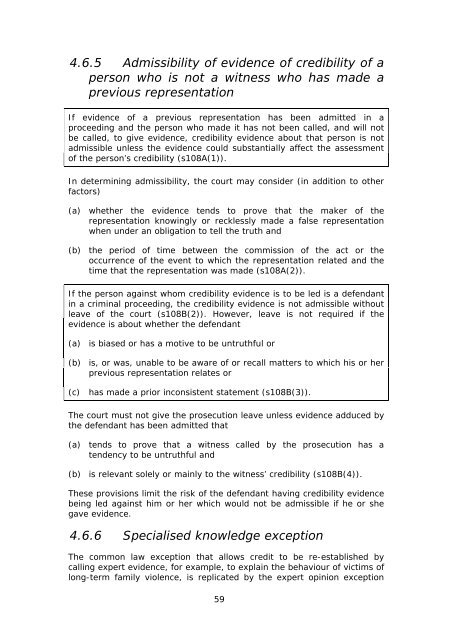Introduction to the UEA - Victorian Law Reform Commission
Introduction to the UEA - Victorian Law Reform Commission
Introduction to the UEA - Victorian Law Reform Commission
You also want an ePaper? Increase the reach of your titles
YUMPU automatically turns print PDFs into web optimized ePapers that Google loves.
4.6.5 Admissibility of evidence of credibility of a<br />
person who is not a witness who has made a<br />
previous representation<br />
If evidence of a previous representation has been admitted in a<br />
proceeding and <strong>the</strong> person who made it has not been called, and will not<br />
be called, <strong>to</strong> give evidence, credibility evidence about that person is not<br />
admissible unless <strong>the</strong> evidence could substantially affect <strong>the</strong> assessment<br />
of <strong>the</strong> person’s credibility (s108A(1)).<br />
In determining admissibility, <strong>the</strong> court may consider (in addition <strong>to</strong> o<strong>the</strong>r<br />
fac<strong>to</strong>rs)<br />
(a) whe<strong>the</strong>r <strong>the</strong> evidence tends <strong>to</strong> prove that <strong>the</strong> maker of <strong>the</strong><br />
representation knowingly or recklessly made a false representation<br />
when under an obligation <strong>to</strong> tell <strong>the</strong> truth and<br />
(b) <strong>the</strong> period of time between <strong>the</strong> commission of <strong>the</strong> act or <strong>the</strong><br />
occurrence of <strong>the</strong> event <strong>to</strong> which <strong>the</strong> representation related and <strong>the</strong><br />
time that <strong>the</strong> representation was made (s108A(2)).<br />
If <strong>the</strong> person against whom credibility evidence is <strong>to</strong> be led is a defendant<br />
in a criminal proceeding, <strong>the</strong> credibility evidence is not admissible without<br />
leave of <strong>the</strong> court (s108B(2)). However, leave is not required if <strong>the</strong><br />
evidence is about whe<strong>the</strong>r <strong>the</strong> defendant<br />
(a) is biased or has a motive <strong>to</strong> be untruthful or<br />
(b) is, or was, unable <strong>to</strong> be aware of or recall matters <strong>to</strong> which his or her<br />
previous representation relates or<br />
(c) has made a prior inconsistent statement (s108B(3)).<br />
The court must not give <strong>the</strong> prosecution leave unless evidence adduced by<br />
<strong>the</strong> defendant has been admitted that<br />
(a) tends <strong>to</strong> prove that a witness called by <strong>the</strong> prosecution has a<br />
tendency <strong>to</strong> be untruthful and<br />
(b) is relevant solely or mainly <strong>to</strong> <strong>the</strong> witness’ credibility (s108B(4)).<br />
These provisions limit <strong>the</strong> risk of <strong>the</strong> defendant having credibility evidence<br />
being led against him or her which would not be admissible if he or she<br />
gave evidence.<br />
4.6.6 Specialised knowledge exception<br />
The common law exception that allows credit <strong>to</strong> be re-established by<br />
calling expert evidence, for example, <strong>to</strong> explain <strong>the</strong> behaviour of victims of<br />
long-term family violence, is replicated by <strong>the</strong> expert opinion exception<br />
59

















